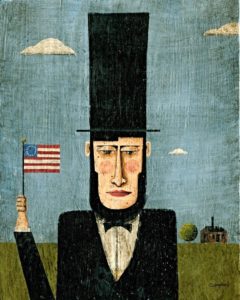Part Three:
On the Ledge
A game with Titanic was set up through Bump McManus, who ran floating games out of the Park Central among other places. Arnold surveyed the room—the bed pushed into a corner, the hats flung onto it—with grudging appreciation, tugging his cuffs, a not superstitious habit, a mark of status. Within the first five minutes—a kill game—he’d managed to lose fifteen grand, bluffing intemperately before the game’s tempo had been suitably established and he could really begin to feel the cards’ interior responsiveness. To others his methods appeared quixotic, but that was part of the puzzle and part of the genius he relied on: mathematics extended into realms others had scant understanding of, tempos of the universe, rhythmic revelations, departures and returns. To him, the tally of acceptable losses, accumulation of others’ tells, the kill bets, the single brazen almost laughable bluff, established a musical score he alone was reading; in full intoxicating thrall of a game, with seeming impudence, he’d happily lose ten thousand, recovering everything when another player took three pots in a row and the kill was on. That was other nights. Tonight, in Bump’s liar, nothing seemed to work. He was off, or the game was. After five hours of sitting with Titanic and nameless guys he’d never seen before tonight, he was down fifteen grand. In seven hours, a hundred and twenty. Bump offered him a drink. Titanic, up forty, yawned, staring with one good eye at his cards, a lax indifference upon the still visibly smashed-up face. Around two thirty in the morning, Arnold came back in a lucky run, bluffing a pair of threes that brought him a pot of fifteen when Bump folded. And a flush when Titanic went all in with a full house of jacks and tens netted him another twenty. Arnold was certain Titanic, or Bump for that matter, was incapable of deceiving him. He studied Bump’s hands, changed the deck five times. Arnold’s supreme amour-propre, his belief in luck following him where he went, had proverbially sustained his sense of himself as he ambled down Broadway, ordered at Sherry’s, or at the table—the private contract between calculation and consequence. But as the morning sun came through the single window—was he getting a delinquent comeuppance, or was the world shifting away from everything he understood? It might have been a question for rabbis. Not the man who bought the World Series.
Want a break? Bump asked.
Deal.
At the end of thirty hours, he was down more than three hundred. Good day, gentlemen. You’ve seen something unprecedented, like a rare comet.
It was dark again. He’d pay on installments, he told Titanic. He pulled out the bankroll, and counted out five.
Fuck him.
H e was as not dead as you could be. The morning he woke up, not a truck delivered a bottle of beer in New York without his say-so, he controlled the Lower East Side, Morris Park, the Gas House, he had his hand in Albany, Buffalo, Cleveland corn sugar operations, booze coming in via the Detroit waterfront, ferried across the Great Lakes and down the Hudson, opium from Persia, Turkey, he had connections with the Boston Irish, the Ozone Park and Staten Island dagos, he was investing in brothels, Broadway productions, dance halls, lately he was seriously thinking of getting into the movies.
Harpo happened to be filming a motion picture in Astoria, and invited him to check out the action. Well, Arnold had seen the brothers’ Broadway shows, but motion pictures had sound these days, a new age was upon them, bellowing saxophones and the syncopated throbbing of sex and industry that the brothers were turning into paychecks, and he might too, if you believed Harpo. At the Paramount Astoria studio, the four Marx brothers—attended by ten or fifteen men running around with boom microphones and klieg lights, whose actual jobs Arnold couldn’t discern—lounged and cavorted between scenes, then snapped into character. An elaborate contraption, the film camera, housed in its own little room for soundproofing and operated by a meager looking cameraman with a mustache who peered through a window, caught some routine where the brothers were chasing each other around, trying to shake hands, for no more than fifteen seconds at a time, it seemed to Arnold, before being interrupted by the director, a titanic pipe-smoking Swiss-Frenchman named Florey, who spoke in an accent tinged with generic European exasperation. They must have done the same damn routine ten times before Florey was satisfied. Without an audience (except Arnold and a few actors and actresses waiting around on the sidelines) the scenes looked vaguely amusing, but couldn’t children have done just as well, he thought. To him, the whole enterprise looked like a poor way to make a dime. Julius Marx especially, with his arrogance and insatiable attention-grabbing, the prop cigars he left all over the studio, was either overacting, blabbing over Florey, or sulking off to read a book, the usual autodidact immigrant striving, like unfortunate rock-headed Socrates Joe.
Harpo, Arnold knew, had always been the natural wit, the one who’d come up with the immortal waiter there’s a fly in my soup joke at Lindy’s, and who could play any musical instrument you put in front of him. If he was a pitying man, he would have pitied Adolph Marx for getting involved in this kind of flimflam, but he merely considered his friend’s circumstances greatly diminished. Yeah, the world was changing, but motion pictures, with their tricks and frauds edited and manipulated to look seamless on the screen, their sound, would never outdo stage shows, where a thousand people were watching your every move. Arnold glided high, high above the commonplace.
On 85th and 5th, his stomach grumbled. Distracted, he looked down at his shoes and the slim horizontal slashes of his pink socks, and, attempting to step over a half-frozen puddle, miscalculated, or simply failed. Feeling his age. A dotted line spattered his shoes, a favorite tan pair, and the cuffs of his trousers, blue. A calamity, minor, but don’t let your afternoon be ruined by the trivial offenses the universe musters against you in its sorry griping, he gave the advise himself, a voice inside his head. From 86th, he made his way down the granite steps and into the Park. He stopped a couple minutes on a bench—huddling against the afternoon’s wintery gusts, and feeling for the solid slab of the bankroll in his pocket. Along the park lake’s surface, from which was rising a diaphanous skein of mist, some ducks were gliding—reigning princes. Standing abruptly, he bumped into an octogenarian, slight, high-minded-looking, who, putting along with a rodenty dog, and wearing a feathered hat far too small for her antique mass of silver hair, stared at him in uneasy disdain.
Pardon—
The dog gave out a warning yap.
In fact it gratified him—perversely knocking the woman off balance, nearly over. He went on his way without looking back.
He had strong views about the laws of entropy. Bernoulli’s Principle. Move fast, unhesitatingly, you have only so much in you, every day incrementally decreases potential energy.
The quest of survival he had understood from a young age, minutiae too trivial to take notice of, the balancing of grandeur and folly, of emperors, sultans, dictators who once rode at the front of legions, carrying pennants, horses plumed and adorned in silver, men whose faces have been forgotten, names erased, the records of their conquests written into history books no one ever reads, or the strivings of those lesser beings to eat and find a place to get out of the rain, eek out their days, either made you a sucker or fully armored you against the day’s offenses. The cold clenched his neck, flapped in the hollows of his jacket. It was starting to rain.
At the Park Central, a liveried doorman held the door. Arnold flattened out a wrinkled five, and pressed it into his hand, the creased negroid palm matter-of-factly enclosing the bill. The lobby was cool, a welcoming place swaddled in criss-crossing shadows, the soles of his shoes were soft on the deep carpet. In room 349, men were seated around the table—Hump McManus, Nigger Nate, a few others. Including Titanic. The women in the room—three or four always seemed to be hurrying in and out—shared mixed notes of Chanel-perfumed refinement and flapper outlandishness with the game’s stench of cigars, the calculated belches. Titanic didn’t acknowledge Arnold, didn’t budge from his seat at the table. His chin, the grim and handsome buttress, had survived Thomas Farley, but the remainder was still bruised, prune colored. Arnold turned away from the table and chatted with one of the women, Lottie Pickford, whose film career had petered out with Son of Zorro a few years ago, replaced by a semi-notorious carousing career. He’d never considered himself an accomplished flirter, he came across as too courtly, he thought, and Lottie, with her reputation for runaway vivacity, possibly considered him stiff, too solemn. Once Lottie had slipped away at a party with him, but Arnold wasn’t in such a good situation in that department these days anyway.
You said you’ve got business, he said to Bump. What’s the news?
What’s the news?
Bump didn’t talk to Arnold like that. Ever. Lottie glared at Bump in Arnold’s defense, and Nigger Nate got up, unbuttoning his trousers before he got to the bathroom. At Nate’s place on the table were a hat and a drink, half finished.
Bump set a pistol on the table.
Once upon a time Bump McManus was a beat cop, shaking people down, speakeasy raids and such, he sponsored floating card games these days, had some girls, contract jobs here and there, his station wasn’t the highest or lowest, somewhere between gutter cleaner and Tammany fixer. Occasionally useful. Bump had friends, brothers, in the precincts, knew someone who knew someone. Titanic and Bump both had shoulders that were sides of beef, they didn’t worry about refinement or anything other than what was in front of them. Bump spun the pistol around on the table with a playful chuckle that you knew wasn’t playful. A Detective Special, a Colt .38.
Mr Rothstein, he said.
The card game was rigged, said Arnold.
You paid five? On three hundred? The Bankroll—
Out of courtesy, gentlemen. Word gets out your games are rigged—
Installment? What about Titanic could have fallen ten stories onto the sidewalk?
Mr Titanic’s window stunt was rigged too. Even so, I paid the ten thousand when there was no chance he would have fallen to his very unfortunate death.
You’re a born fixer, A R, Hump said.
Titanic picked the gun off the table, pointed it out the window. Bang, he said.
Nate returned from the bathroom, and seeing Titanic and the gun, said, taking a seat, We don’t need this shit.
It was discreditable, playing games with this type. It was one thing engaging in business with Bump and his kind, the hard necessary of being in hard businesses, another to sit at a table and try to pretend you were on equal footing, that democracy extended this far. You have a life and you don’t know you’re wasting it till the moment it all feels like a waste.
You think I’d be angry at you, but I’m not, said Titanic, setting the pistol down. You’d think I’d want to kill you.
Arnold started to rise from his chair, the stomach protesting again.
Gentlemen—
Nate reached for the pistol. Bump tried to stop him, his pork-chop-size hand over Nate’s tidy fist, there was a quick rapping sound, almost forgotten as soon as it was heard, like a single knock on a door, Nate said, Holy—, and Arnold, Big Brain, the Bankroll, the man who fixed the World Series, tipping the chair, tumbled over, sprawled in his blue suit with the tasteful red pinstripes, the leather soles of favorite shoes scuffed and worn on the insides of the heels, his yellow fedora coming to rest against the hissing radiator. Arnold rolled over, pressed himself up, he was standing like a wounded bear, almost tipping but not. Knees locked, he retrieved his fedora, steadied himself, legs carrying him out the door, Hump and Nigger Nate and Titanic at the table, cards face down, only Lottie rushing to help, taking his elbow, saying, Mr Rothstein, Mr Rothstein—, and, steadying himself on the railing, Lottie behind, he staggered down the back staircase, through the grand lobby with plush carpet and out into the jumbled-up commotion of 57th, the strollers in fashionable clothes, pushcart men, Broadway folk sniffing at the air with the proprietary attention of dachshunds, a couple cops laughing at some bum, some guy playing bagpipes, the sky, rainless now, vaulting over the Park, autos speeding uptown toward mysterious destinations—the theater, dinners, Polo Grounds, trysts, a confession—and, oh, the grand folly and exuberance and fresh tableau of the city, the universe, that had been his.
The Autopsy Report:
BODY
Body is that of a middle-aged white male, appearing to be the age given, scale weight 169 pounds, 5 ft 7 inches in height, well formed, well developed.
Nose natural, lips natural, 4 days growth of hair.
There is a false rubber plate in the upper [jaw]. Lower jaw shows goldwork, right lower lateral incisor and also goldwork on the canines. The premolars are absent. The first molar is present. Left lower all absent.
In the penis there is a catheter retained by tape. Foreskin cut.
There is a single bullet wound situated in the right belly, 3 1⁄2 inches to the right of the midline, 38 1⁄2 inches above the right heel, 2 1⁄2 inches in front of the right anterior superior iliac spine and 1⁄2 inch above it.
Brain weighs 1400 grams.
CAUSE OF DEATH
Bullet wound of the belly, large gut, urinary bladder, prostate and pelves. Homicide.
CLOTHES
High tan shoes, marked Robert Whyte, 38 West 45th St., New York.
Fancy multicolored tie. Label: F. Georges, Boul. Des Capucines, Paris, France.
Blue garters. Lisle socks with white feet.
Turned down blue Lane 15 1⁄2 collar, laundry mark 2633, covered with dry vomitus.
Blue coat with red pin-stripes. Label: Wm. Wallach, N.Y. With vomitus on the collar and shoulders. There is a single hole just below the front edge of the lower pocket. No flares. Trousers of the same material. On the right side, upper portion, there is also a hole which passes through the label of the tailor attached to the pocket: Wm. Wallach, N.Y., N.Y. Custom Tailor. Arnold Rothstein, 10/29/27.
Silk shirt. Label: Harry Beck, Custom Shirt Manufacturer. With the initials A.R. and a hole in a corresponding position.












